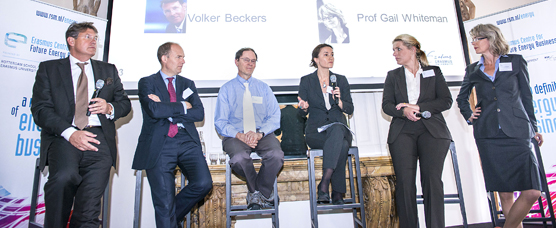Panel: Innovate grids; write new rules

Speakers who had already made presentations addressed questions submitted by the audience. They included Kerstin Meerwaldt, Volker Beckers, Huib Morelisse, Jessica Stromback, Dr John Collins and Prof Gail Whiteman.
The electric car is more efficient, and it will make a breakthrough, panellists agreed. Meerwaldt said electric cars will have 3-8 per cent of the market by 2020, but challenges remain, such as developing the roaming services required to charge different manufacturer’s cars. But the combustion engine will remain for years to come, she added.
The smart grid is also facing significant challenges. First, governments have underestimated the cost of protecting it against cyber-attacks, said Volker Beckers. Second, standards have yet to emerge, and third, the existing regulatory infrastructure only accommodates one-way energy supply routes from producers to consumers; the entire system would need overhauling to enable ‘prosumers’ to feed power generated by domestic renewables back to the grid. The final point was contributed by Jessica Stromback, executive director at the Smart Energy Demand Coalition.
<link people gail-whiteman _blank>Professor Gail Whiteman from RSM stressed the Earth system perspective; it’s imperative to reduce carbon emissions because the price tag of the changing Arctic ecosystem – underwater methane release in the East Siberia Sea – is US$ 60 trillion. Jessica Stromback said carbon emissions are a tough problem, considering business imperatives and time horizons of only five years. Dr Collins argued that this public policy issue is unpopular in his native USA. Government, science, and industry must bring about change together, said Meerwaldt. Dr Collins advocated vegetarianism to reduce carbon footprints, and Prof. Whiteman said we should applaud business leaders already addressing the issue, and not wait for governments.
Engaging the public is a challenge faced by all companies ‘going green’, said Mr Morelisse. Meerwaldt said BMW firmly believes and invests in renewables, even without German subsidies. “Don’t ask the consumer what they want, give it to them,” suggested Professor Whiteman, quoting the late Steve Jobs of Apple Inc. Mr Morelisse argued that combining social with economic goals is important, as does Unilever. Mr Beckers agreed, as old business models are no longer effective. He added that the EU should regulate costs.
Consumer demand in Europe is flat, but the situation in developing countries is different, Ms Stromback noted. Mr Beckers highlighted two issues: first, prosumers need to be told they can become generators, and secondly, consumers need to drive investment in renewables. Having installed solar panels at home, Dr Collins said it was a good deal. Third World villages might well develop small grids around solar cells, he added.
Financial markets are one venue for change. The World Business Council will need to change the short-term capitalistic model, Professor Whiteman said. There is an encouraging trend for more funds for green projects, Ms Stromback noted, and Mr Morelisse acknowledged that funds increasingly limit themselves to investing in companies with decent environmental policies. Mrs Meerwaldt agreed; many established businesses at the recent Bloomberg Energy Forum believe in long-term investment in renewable energy.
You can get a smart grid tomorrow, if you want, according to Ms Stromback. Even without a smart meter, it can be done through on-bill financing, and the changes may happen faster than you think, said Mr Morelisse. Mr Beckers proposed that every household in the UK would be smart-metered by 2020. In the USA, infrastructure for the smart grid is available but the overlaying system is missing, according to Dr Collins. Different markets are at different developmental stages, Mrs Meerwaldt concluded. Utilities should innovate their grids; regulators should write new rules.

